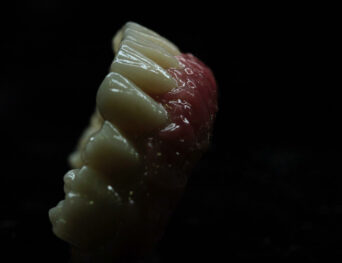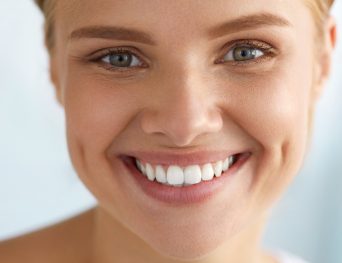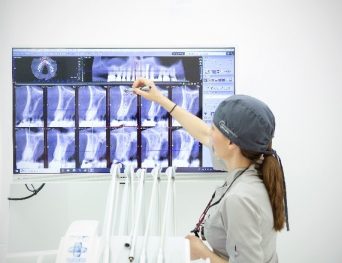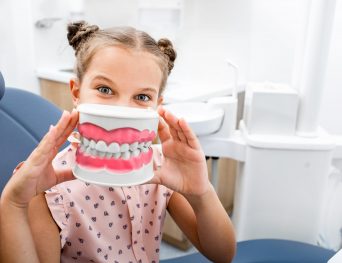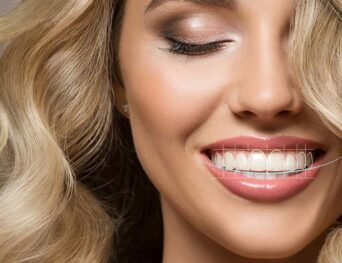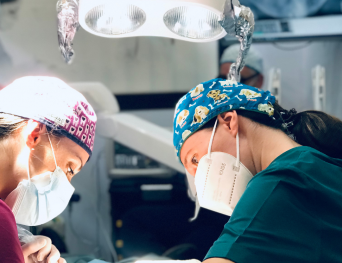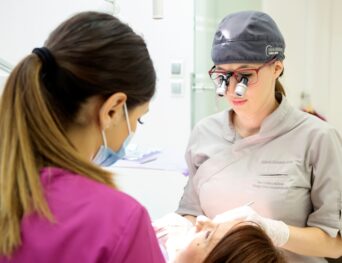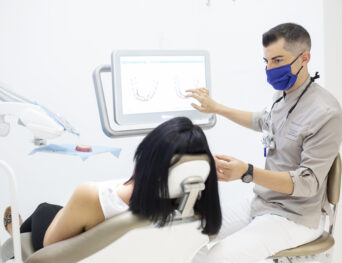Orofacial pain and bruxism
Bruxism is the unconscious habit that involves friction of the teeth during the night or day. It is often linked to situations that require high concentration, worries, stress, anxiety, etc.
In many cases bruxism is due to the fact that the upper and lower teeth are not properly aligned and there is a bad occlusion. Orthodontics may be one of the solutions that the specialist dentist can recommend.
Sometimes it is due to some sleep disorder. The consumption of alcohol and caffeine can aggravate this condition, so we recommend moderating your consumption.
The consequence of bruxism is the deterioration of the functions of the chewing apparatus, especially on the joint that connects the jaw with the base of the skull (temporomandibular joint or ATM). Except at the time of chewing or swallowing, our teeth should not be in contact. If this happens frequently, we subject the entire chewing device to an overexertion that, little by little, deteriorates it. The muscles of the face, those of the neck and all those surrounding the jaws are contracted, the jaw joint wears out, the teeth withstand excessive forces and outside their function, the gums suffer from poor blood circulation and, consequently, The whole system is unbalanced.
Some of the main symptoms associated with bruxism are the following:
Noises when opening and closing the mouth.
Jaw pain or widening of the face due to an enlarged muscles
Increased sensitivity in teeth and gums
Tooth enamel wear
Dental malocclusion
Headache and pain in the cervicals and trapezius
Discomfort or discomfort in the oral area when getting up in the morning
Noises during the night when you clench your teeth
Breakage of a tooth or tooth or fall of covers and fillings
Bite your tongue often
Mobility in the teeth
Earache or tinnitus
Snoring or snoring
The key to diminishing the effects of these neurophysiological disorders will be early diagnosis. The evolution will be a function of the time of establishment of the habit, of the dental wear and of the other associated symptoms. To obtain an adequate diagnosis and treatment, the specialist of the dental clinic Dávalos & Balboa in ATM, orofacial pain and bruxism must perform a complete study of the patient to be treated and in many cases collaboration with other professionals, such as the otolaryngologist, the physiotherapist, is essential , the rheumatologist or the psychologist.
The most commonly used treatment for bruxism is occlusal splints or discharge plates, which are tailored to each patient. These devices are made of a transparent plastic material, which, according to each case, is placed at the level of the upper or lower arch. A complete study is essential prior to the splint to obtain the diagnosis and recommended treatment for each case.
At the same time, it is often important to make some changes in diet, exercise, physiotherapy, relaxation techniques and, in certain cases, the help of psychotherapy or drug treatment is necessary.
Temporomandibular dysfunction
The temporomandibular joint or TMJ is the joint that allows the movements of the jaw. Temporomandibular dysfunction is an alteration of the structures that make up the ATM. There are multiple factors that can contribute to causing temporomandibular dysfunction, such as genetic predisposition, dental malocclusions, bruxism, postural habits, sleep disturbances, among others. The causes of these dysfunctions are diverse, but they are always related to the components of the masticatory system: muscles, teeth and the temporomandibular joint.
The best prevention for temporomandibular dysfunction is the control of the factors that cause it. The most appropriate treatments to be performed should be indicated by the ATM specialist of the Murcia Dávalos & Balboa dental clinic after a precise study, with the corresponding diagnosis. Some of these treatments can be: orthodontic treatments in cases of bad dental occlusions, discharge plates for bruxism, modify postural habits, intraoral devices to treat sleep disorders, etc.
Orofacial pain is the result of a painful impulse, caused by lesions in the mouth and face, which is sent to the brain by a common route: the trigeminal nerve. Orofacial neuropathic pain occurs as a result of damage or disorder in the nervous system due to trauma, metabolism disorders, nutritional deficiencies, cancer, arthritis, infections, infarction or brain injuries, multiple sclerosis, tumors or other causes.
The specialist in orofacial pain and bruxism of the dental clinic Dávalos & Balboa, in Murcia, after a study and a diagnosis will indicate the most appropriate treatment for each patient.



